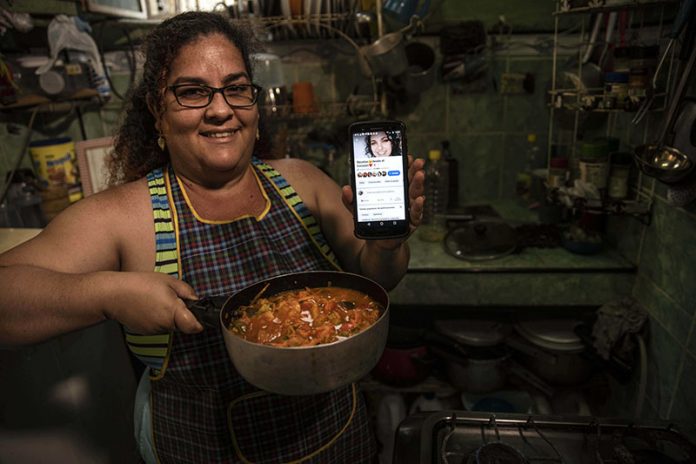
By ANDREA RODRIGUEZ
Associated Press
HAVANA (AP) — If you don’t have potato, use malanga root. If you can’t find zucchini, replace it with cucumber.
Can’t find the ingredients you want? No problem: Yuliet Colón will help you whip up a dessert using the eggs you ran across, swap pork for the ground chicken in that recipe, even peanuts for beans in your Cuban-style rice.
She’s among a number of Cubans who, with more ingenuity than resources, help their compatriots cope with shortages exacerbated by the new coronavirus pandemic with Facebook posts of culinary creations designed around what they’re actually likely to find at the market or with government rations.
“I love Master Chef Spain, but where do I get liquid nitrogen in this country?” joked Colón, a 39-year-old mother of two and one of the creators of the Facebook page, “Recipes from the Heart.”
The site, launched in June, how has more than 12,000 members — many of them on an island just becoming accustomed to social media due to recently improved internet access.
The combination of COVID-19, which shut off income from tourism on the island, local economic productivity woes and sharpened U.S. sanctions imposed by former President Donald Trump has led to increased scarcities in Cuba, where gross domestic product decreased by 11% in 2020.
Long queues became noticeable last year, and 2021 opened with government economic reforms that effectively raised both prices and pay — though not always at the same rate.
Colón last week visited an agricultural market near her house and, after standing in lines for about 40 minutes, bought the few vegetables she found.
She used them to create something that she called “Cuban-style pisto manchego” which includes onion, peppers, tomato, eggplant and cucumber — winning admiring comments from other group members.
These days, Cuban household staples come and go without warning. When toothpaste appears, deodorant disappears, and when it returns, soap and the toilet paper have vanished. The same is true for rice, beans, milk, cheese, onions, tomato and or garlic. Fruit has not been seen for weeks.
Sometimes potato disappears, prompting Cubans to turn to other tubers popular in the region, yuca or rough-skinned malanga.
The Facebook site has become a home for proposals on how to chicken when it’s the only meat available or create artisanal cheeses with others aren’t available.
“There are a lot of shortages”, lamented Colón in the small kitchen of her house while she prepared her “pisto manchego,” chopping the vegetables and photographing the process before uploading the images.
She added a bit of fresh basil and oregano she took from a small flowerbed that a relative grows at the side of her house.
“What I like the most is making desserts, but now it’s hard to get eggs, milk or flour,” Colón said.
The Facebook page is an internet-era democratization of earlier efforts to help Cubans make due in hard times, notably following the collapse of the Soviet Union, which devastated the economy of its Caribbean ally in the early 1990s. A TV cooking show at that time once offered suggestions for cooking grapefruit rind steaks.
Thanks to arrival of internet access, services to manage food or deliver merchandise have proliferated and relatives abroad can even directly pay telephone bills for those on the island. Cubans can share tips on WhatsApp or Twitter about which stores are stocked with which products.
They’ve also helped make authorities more accountable in some cases — as when a state factory distributed croquettes that cooks complained seemed to explode when put in oil and authorities responded with explanations in the local press.
Colón relies on the internet to communicate with her mother, whose deposits help pay for web access that keeps her on Facebook.
Colón usually adds a few family anecdotes in her posts.
“The kitchen is my happy place, where I am calmer and I feel better,” she said.


















